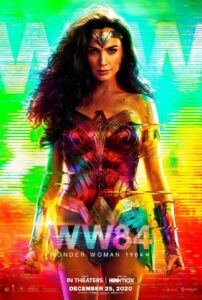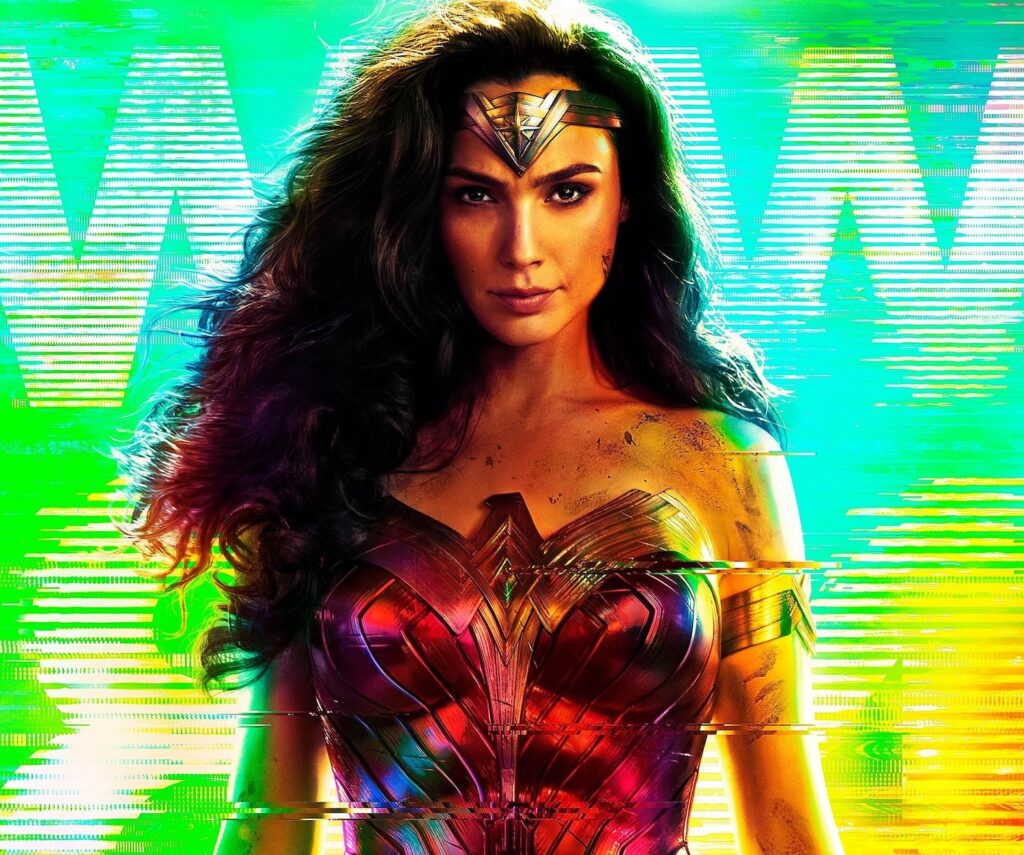
Wonder Woman 1984 (Patty Jenkins, 2020) 1 out of 4 stars.
The 2017 Wonder Woman, though not without some issues (of aesthetics and narrative), was a stirring entry into the ubiquitous superhero genre, introducing a powerful female icon into a heretofore male-dominated cinemaverse. And though star Gal Gadot may not have overly impressed with fine acting skills, she nevertheless more than held her own opposite the likes of Chris Pine, David Thewlis and Danny Huston. Director Patty Jenkins kept things moving along nicely, and despite some questionable CGI the final result landed an effective dramatic punch. The stage was therefore set for an appealing sequel.
Unfortunately, past may be prologue, but not necessarily prediction. Which brings us to Wonder Woman 1984, bringing Jenkins and Gadot back together again, the former now also a co-screenwriter. With a plot that zigs and zags at uneven intervals – fast when it should be slow, and vice versa – and additional characters with muddled motivations, plus a central story device that makes absolutely zero sense, even within this comic-book world, the new movie fails to deliver on the promise of its predecessor. At two and a half hours, it has but ten additional minutes over the first installment, yet feels much longer, bloated with exposition. Worse (for the genre), there is no major rousing action to speak of, beyond an opening sequence, until over halfway through. What wonder there was has vanished.
As the title indicates, we are now in Reagan-era America, following an initial flashback to Wonder Woman’s childhood on the island of Themyscira. This opener reveals how Diana (aka Wonder Woman) early on learned the importance of telling the truth, a moral lesson meant to bear influence on later plot developments (spoiler: the connection is tenuous). We then jump to adult Diana, now living in Washington, DC, where she works as an anthropologist for the Smithsonian. All these years after the first film’s World War One-era events, she’s still bereft over the death of her beloved, Steve (Pine), but soldiers on, occasionally moonlighting as a crimefighter. Given the terrible visual effects on display here – every time Diana flies through the air, it is painful to behold – the less of these activities we see, the better, despite our aforementioned hunger for big set pieces.
Not to worry, for there are new people to meet, among them gawky gemologist Barbara Minerva (Kristen Wiig, Where’d You Go, Bernadette) and would-be oil tycoon Max Lord (Pedro Pascal, Prospect). Or maybe we should worry, as they bring nothing but mayhem, and not the good kind, to the proceedings. Wiig does her usual self-conscious bumbling, trying a little too hard to force the comedy, her character that unfortunate trope of the shy wallflower who embraces sudden power as a way to vent long-held grievances. Pascal goes full-on manic as the primary villain, his histrionics an apt metaphor for a movie out of control. Neither do their best work.
And then there’s Pine, brought back to life courtesy of an ancient mystical object, sought after by Lord, that grants those who hold it one wish. For no discernible reason, however, he does not return as his actual physical self, but instead inhabits the body of a hapless “handsome man” (as he’s listed in the credits), played by actor Kristoffer Polaha (Beneath the Leaves). Did Polaha – a very nice person whom I have actually met before – need the gig, or did someone owe him a favor? In any case, he’s barely on screen, though just long enough to confuse. For most of Steve’s return, we, like Diana, see him as Pine. The mystery of why she could not just conjure Steve in the flesh as well in the mind is not only never answered, but never discussed.
That’s really the least of the problems here, though. As viewers, we struggle not only to make sense of the mechanics of wish-granting but of what, exactly, Lord, who accumulates more and more power throughout, actually wants. There’s more logic to Minerva, who wishes to be like Diana and then effectively assumes her strength and skills, but even then her turn to violence only holds together if we believe that lurking inside every nerd is a vengeful killer waiting to break free. And that’s not even the most offensive cliché here; just wait until the narrative leaps to the Middle East, rife with many a cinematic stereotype.
It’s a mess, in other words, failing to both entertain and inspire. Gadot’s performance reflects this, her wooden delivery doing nothing to enliven the deadly exposition. Yes, there are a few moments here and there that shine – including a hilarious dressing scene for the early 20th-century Steve, inexplicably attracted to a waist pack he finds in handsome man’s apartment – but they are not enough to elevate the rest, even if the one post-credit scene offers a welcome surprise. This sequel is a dud; time to move on.

